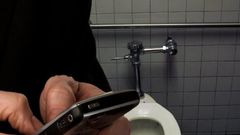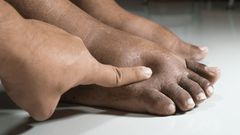For many Nigerians and West Africans, a quick dash to the restroom often morphs into an extended escape—a time to scroll through social media, catch up on WhatsApp messages, or even drop a tweet or two. What may start as a three-minute “nature break” frequently ends up stretching into 15 minutes or more, a routine that’s become all too common in homes and offices across Lagos, Accra, and beyond.
While extended toilet breaks might seem harmless, especially when you’re glued to your phone or simply enjoying some private time, health professionals strongly caution against spending too long on the toilet. Dr. Lai Xue, a colorectal surgeon at the University of Texas Southwestern Medical Center in Dallas, warns that lingering on the toilet can lead to significant health challenges, including weakening of the pelvic muscles and a heightened risk of developing haemorrhoids—a concern echoed by many local Nigerian healthcare practitioners in major urban centres.

haemorrhoids
“When patients present to me with complaints, one of the main areas we have to delve deeply into is spending a lot of time on the toilet,” Dr. Xue explained. This sentiment is also reflected by top gastroenterologists in West African teaching hospitals, who report a noticeable uptick in younger people suffering from bowel-related challenges due to new habits around device usage in restrooms.
Dr. Farah Monzur, an assistant professor of medicine and director at the Inflammatory Bowel Disease Centre at Stony Brook Medicine, advises that ideally, people should spend only five to ten minutes on the toilet. So why is staying longer risky? As Dr. Xue highlights, gravity doesn’t just keep our feet on the ground—it also draws blood toward the lower body when sitting, which means the heart must work harder to pump blood upwards. The longer you sit, the greater the effort for your circulatory system, potentially leading to uncomfortable and sometimes dangerous side effects that are often overlooked in African settings where regular checkups may be rare.
Health Risks of Overstaying in the Toilet
Unlike lounging on your living room sofa, perching on the typical oval-shaped toilet seat compresses the buttocks and causes the rectum to sit lower, increasing pressure on delicate blood vessels. The force of gravity during this position further impairs blood flow, making the rectal and anal regions especially susceptible to problems.

Healthworkers
“It becomes a one-way valve where blood enters, but blood really can’t go back,” Dr. Xue explained. When this happens regularly, it raises the chances of haemorrhoids—swollen veins and blood vessels that develop around the anus and lower rectum, which is a surprisingly common condition even among urban professionals in Abuja, Port Harcourt, and Kumasi.
Dr. Monzur adds that prolonged sitting leads to excessive strain on the anal muscles, increasing pressure inside the rectum. More often than not, it’s the distraction from phones, newspapers, or even TV sets in the “convenience room” that makes people lose track of time, putting them at risk without their knowledge—a trend reportedly rising in many middle-class West African homes.
Doctors are taking notice. Dr. Xue observes, “Nowadays, we’re seeing an increase in people spending more time on the toilet, and that is very much unhealthy for the anorectal organs and the pelvic floor.” Similarly, Dr. Adeyemi Grace, a Lagos-based gastroenterologist, notes that more patients are seeking medical advice for symptoms ranging from discomfort to more severe complications because of this overlooked habit.
Beyond haemorrhoids, Dr. Monzur warns that relaxing too long on the toilet may weaken the anal muscles and prompt unnecessary straining, raising the risk of rectal prolapse—a concerning condition where the rectum actually begins to protrude through the anus. This is an issue that can disrupt everyday life and may require advanced medical intervention that’s not always readily accessible in rural African settings.
The pelvic floor muscles are essential for coordinating smooth bowel movements. According to Dr. Xue, these muscles collaborate with your body to allow stool to pass without effort. However, sitting for too long due to distractions or “toilet phone time” places unnecessary pressure on the pelvic floor, gradually weakening its function—a point repeatedly highlighted in local wellness campaigns.
Dr. Lance Uradomo, an interventional gastroenterologist at City of Hope Orange County in California, recommends leaving behind phones, magazines, or any reading material before heading to the restroom. By making the toilet environment boring, you’ll be less tempted to linger—and your body will thank you for it.
“You don’t want to go with the mindset that you will be there for a long time. Because then you’ll want to bring something to keep the mind occupied,” says Dr. Monzur. “Make sitting on the toilet bowl as uninteresting as possible.” This might sound harsh, but in the long run, cutting screen time in the restroom could protect your health.
Simple Ways to Shorten Toilet Time
If you’re having difficulty using the bathroom, Dr. Xue suggests strictly limiting yourself to just 10 minutes on the toilet. If you’re not successful, leave the restroom and take a light walk; physical activity stimulates the gut, helping trigger a natural bowel movement. Staying hydrated and eating foods high in fibre—such as beans, oats, ugwu (pumpkin leaves), or plantain—are proven ways to make stools softer and easier to pass, reducing the urge for unproductive straining.
To maintain healthy digestion, the National Academy of Medicine recommends that adults consume 2.7 to 3.7 litres of water daily. Meanwhile, the U.S. Department of Agriculture recommends aiming for 14 grams of fibre for every 1,000 calories eaten. Dr. Xue emphasises that combining adequate fibre with sufficient water leads to softer stools, helping prevent digestive discomfort and dangerous complications.
Sometimes, prolonged toilet use isn’t simply a bad habit. Persistent constipation or the constant urge to strain might signal a more serious issue, such as chronic gastrointestinal conditions like Crohn’s disease or irritable bowel syndrome (IBS). In Nigeria and Ghana, doctors caution that difficulty in passing stool, combined with unexplained pain or bleeding, should never be ignored.

Phone in the toilet
Worsening constipation or a growing need to remain on the toilet could point to life-threatening problems, such as colorectal cancer. Dr. Uradomo warns that a large growth or tumour in the colon can block stool movement, causing constipation, pain, or bleeding—symptoms that must prompt urgent hospital visits. According to the American Cancer Society, colorectal cancer rates have spiked among those under age 55 since the mid-1990s. In 2024 alone, projections include 106,590 new cases of colon cancer and 46,220 cases of rectal cancer in the U.S.—a worrying trend reflected in urban African clinics as more young professionals present late with similar symptoms.
Dr. Uradomo notes that over the course of his career, there’s been a marked increase in younger patients who seek treatment for what seems like ordinary haemorrhoids or constipation but are eventually diagnosed with cancer. The implication is clear: if constipation, rectal pain, or bleeding is persistent, don’t just change your bathroom habits—reach out to a qualified health professional immediately.
As toilet time continues to increase in line with phone habits across Nigeria, Ghana, and wider Africa, the need for health education has never been more urgent. While digital distractions are a daily reality in today’s connected societies, being mindful of one’s own bodily signals remains critical for long-term wellness. Nigerian healthcare workers recommend setting time limits, avoiding distractions in the restroom, and emphasising a diet rich in local high-fibre foods. Greater awareness, regular medical checkups, and heeding early warning signs may help curb the silent epidemic of preventable bowel problems affecting youth and adults alike.
Have you noticed your own bathroom breaks getting longer lately? What local remedies or healthy toilet habits have worked for you or your community? Share your tips and experiences!
What’s your take on this growing health trend? Do you have unique strategies for improving digestive wellness or want to share your personal story? Drop a comment below and follow us for more health and lifestyle updates tailored for West Africa!
Have a story you want to share or sell? We’d love to hear from you! Email us at story@nowahalazone.com to get your story featured or discuss story sales.
For general support, reach out at support@nowahalazone.com.
Stay connected with the latest updates! Follow us on
Facebook,
X (Twitter), and
Instagram.
We look forward to your feedback and stories—let’s keep the conversation going!










